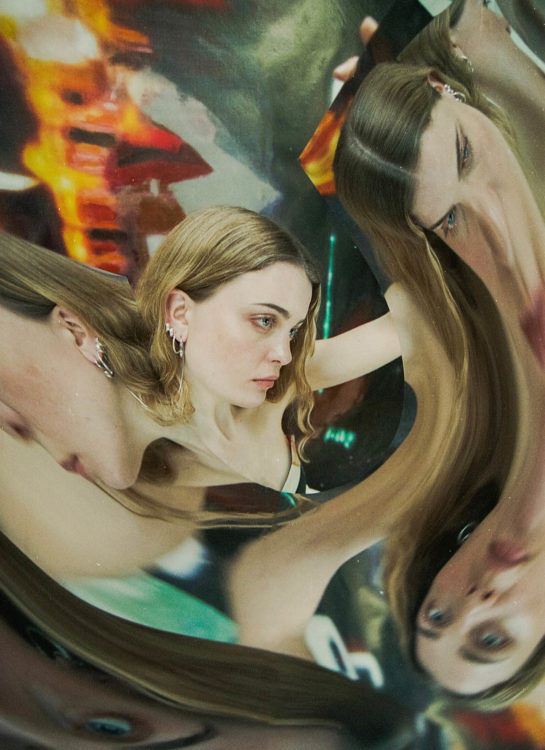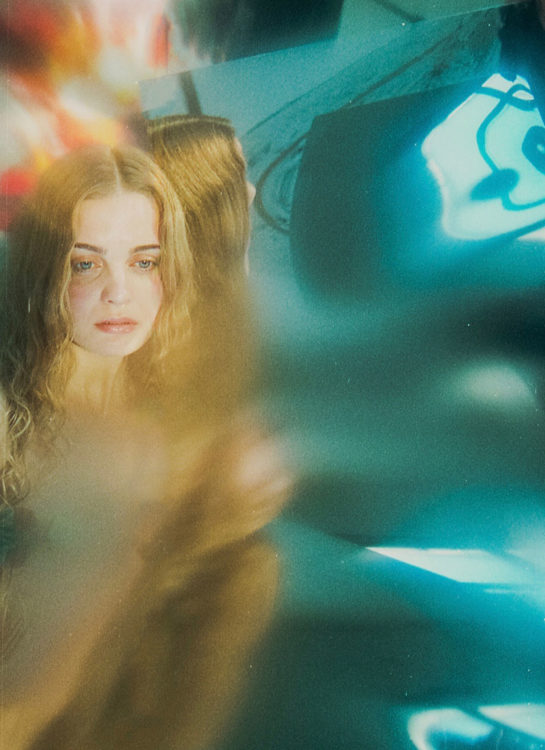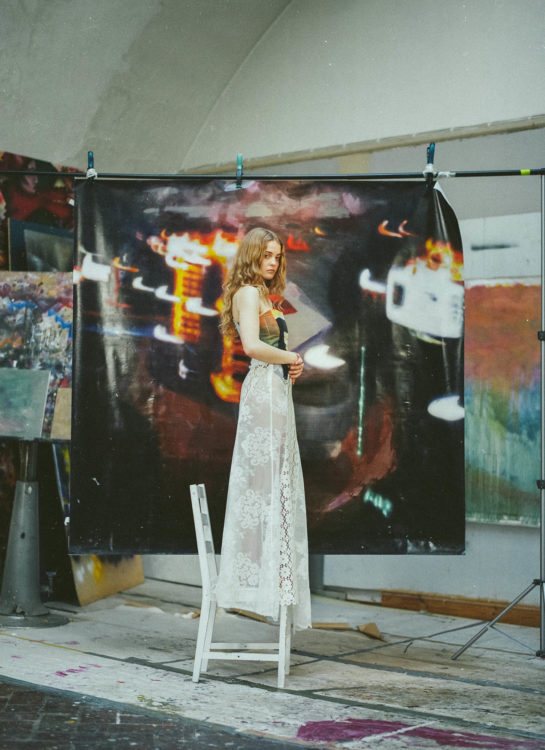- Words Miriam Balanescu
- Photography Olof Grind
Swedish singer Noomi on her new single “Free At Least”, testing the limits of pop, her musical upbringing, and much more.
In her late teens, Noomi discovered trip-hop – and that was the supernova of her musical career. Under the influence of 90s legends Massive Attack, Radiohead, and more, in her track “Ride”, she combines a soaring drum n bass beat with her sweet lulling vocals, while in “Tonari” she blends sitar-like instrumentals with unusual backing effects. Early in her journey as a musician, the Swedish artist already has a taste for out-of-the-box pop.
Embarking on her official career as an artist happened as a kind of accident. After texting her friend with a link to some of her demo songs, Noomi suddenly wound up with a meeting at Universal Music Publishing. Her friend had taken matters into his own hands and contacted numerous publishers with her music. Since then, Noomi has crafted a unique sound that aims to experiment with the conventional “pop formula”.


Before then, music was the backbone of Amanda Börjeson’s, aka Noomi’s, life. She was raised in a musical family, playing classical and folk violin. This has had an unmistakable influence in her work, with carefully chosen instrumentals and a desire to cross the borders of genre.
Now, Noomi is preparing to let her debut EP “Life Aqua” out into the world. Ahead of its release, we caught up with the burgeoning to talk about stage names, her musical journey, and what she’s most looking forward to in 2021.
“Free At Least” has multiple phases and transformations in time signature and backing. How did you go about stitching these together and what was your creative process?
‘Free At Least’ was actually just written over that triplet 6/8 pluck figure on guitar, and the whole song came together rather quickly. I didn’t think too much about the complexity of it if I’m being honest. The whole writing process felt very pure and free. I had been listening to a lot to Nicholas Jaar by the time we wrote the track and his phased-out, ambient textures inspired me to do something similar with our soundscape. I wanted it to feel like beautifully muddy, fluid movements. Like a blurry tide running in and out, like a good kind
of seasickness.
Your latest single is a lot more chilled than your previous two tracks. What drove this change and is this something we can expect from your future music?
Serene melancholy has always played a big part in music that I make and listen to. It really is
the core of everything, it just comes in different forms and shapes for us to perceive. The best
uptempo songs always make your heart break as much as it makes it thrive. There’s nothing
like a one-lane, one-stream feeling. Every part of you is looming in the corners of every great
song, and I think that’s what truly makes something great – the presence of all your
different sides.
After discovering trip-hop in your teens, this completely transformed your sound. How
did you discover musicians like Massive Attack and Radiohead and why did this have
such a big impact?
I can’t really remember how, why or when I discovered that music. I’ve collected music onto
playlists, cassettes and home-burned CD’s (my sister and I made those all the time) for as long as I can remember. Growing up I wasn’t really introduced to any music besides classical music by my parents so I kind of had to find everything by myself. I was a very angry, obstinate teenager who would lock myself inside my room thinking the only one who understood me was Henrik Berggren (from Broder Daniel) or Thom Yorke, and I think it was not only the music but maybe particularly the sense of belonging in a social context connected to that music that made it so important to me.
Could you tell us more about your musical upbringing, your experiences with
classical/folk music and why, as you say, you felt “misplaced”?
I was brought up in a musical family where really any kind of creativity was always highly
valued. My dad builds, repairs and tunes organs all over Sweden and Europe, and my mum is a conductor, so naturally I started singing in choirs before I was even old enough to use my voice because it was more practical for my parents to let me take part in rehearsals instead of finding someone to babysit me. I also played violin for over ten years, but was way too restless to practice enough to make something serious out of it. Even if all that gave me so much and still influences me a lot, I’ve always longed somewhere else. Looking back I feel that the musical environment I grew up in was an atmosphere set up by many do’s and don’ts. A lot of practicing and not much about creating. So, emerging into writing music of my own was kind of my way to break free and finally enter another cultural world even if I didn’t know much about it at all.
Instrumentals are so key in your music. How do you decide on what instrumentals to go
for? How do you go about putting a twist on contemporary pop and testing genre
boundaries?
I’ve had this fixed idea for a really long time that I want every song to feel like a robot that you realize was human. I’m always looking for the collision between heavy processed, distorted frequencies and the raw, untouched and intimate elements put in some kind of updated 90s trip-hop aesthetic. People like Bonobo, Aphex Twin or Tim Hecker have been absolutely crucial for the way I think about production today, even if trying to achieve the same broadness and depth in a pop song as instrumental-driven music like theirs has, is quite challenging at times. That being said – even if I want to be more bold and daring when it comes to production, it should never compensate for a poorly written song. I really
stand by that!
You have said that your new EP documents a period of your life. Could you tell us more
about this period and what it represents to you?
I wrote it when I was on my way into what ended up being my first long-term relationship, getting almost terrifyingly close in a way that I’ve never experienced before. I’ve always been quite reluctant with writing about love up until then. I think I had this idea that me being in love was equal to me showing weakness, which – before it struck me – was a facade I worked really hard to maintain. Now I know that I actually am capable of giving and receiving love, and that has changed me to the core. As a lot of things have changed since I wrote it,
I feel very sentimental putting it out now. It’s like taking a walk on broken lands, spotting all the nooks and crannies you remember in a certain way, realizing things don’t look like
that anymore.
You interestingly said that “my creative side is surely my most destructive one”. What
did you mean by this and do you think songwriting is in some way problematic?
I don’t think songwriting is problematic but the part of you who wants to write is. And that’s also why it’s so important that we keep on doing it. Writing becomes a way of existing. You put your whole self-worth in what you produce, and as long as you are stuck in that hamster wheel of chasing adrenaline rushes of creative contentment – it sort of consumes you.
What are you most looking forward to in 2021?
Hopefully the next season of What We Do In The Shadows comes out. That would increase my
well being drastically.



